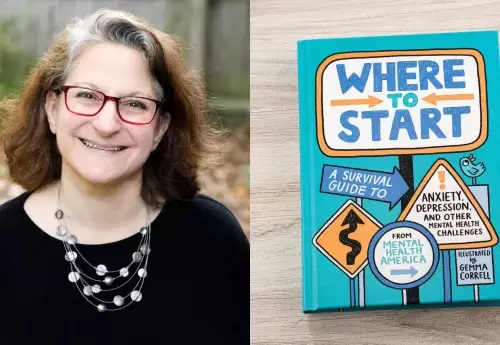
My life was spinning out of control, and I barely noticed.
I had just returned from a 3-mile run and was now lying face down on the floor of my bedroom. I felt completely immobile, mentally and physically. I suddenly had no motivation to do anything. My brain started saying things like "nothing matters" and "what's the point of it all?" I stared into space until I finally had an ounce of motivation to get up and go to the bathroom.
About an hour later, an idea came to me in a flash. I would train for a marathon! No, an ULTRA MARATHON! My thoughts were moving so fast I couldn't sit still. I got ready to go for another 3-mile run. This time I ran even harder and faster. I had something to train for now!
When I returned to the co-op where I was living with my partner, I ended up back where I had started: face down, totally immobile, on my bedroom floor. My partner knocked on the door. It took all of my energy to say, "Come in." They saw me lying there and knew I had already gone for two runs that day.
Seeking help
"Jeez, this must be exhausting," they said as they came to lie next to me. It hadn't occurred to me that my behavior might be abnormal until they said that. It was then that I realized that I was, in fact, exhausted, confused, and very scared. "I need help," I said to my partner with tears in my eyes.
Thankfully, they knew of the Triangle Program, a virtual mental health outpatient program specifically for queer people in the Boston area. I contacted Triangle to be sure my insurance would cover it, and a few days later, I started the program.
I had completed two outpatient programs in the past, and I had already been hospitalized six times for mental health reasons. Part of me just didn't see the point in doing another program. After these previous programs hadn't seemed to make a difference, I had decided that I would take care of things on my own.
Creating routines
A friend of mine recommended the book "The Miracle Morning" years earlier. It talked about the power of creating a healthy morning routine to transform your life. And this book did transform my life. I went from sleeping and watching T.V. as my primary activities to meditating, journaling, running, and reading. I was living with my parents at the time because I was struggling so much with my mental health. This morning routine, in addition to the support of my amazing Mom, Dad, sister, and friends, finally allowed me the ability to be independent again.
I moved out of my parents’ house, started a teaching job, and met my partner. About a year and a half later, when I had moved into the co-op, things started feeling more challenging. Or maybe, they had always been challenging–I had just finally slowed down enough to realize what was going on. My morning routine was no longer keeping me stable. I knew that this was not something I could muscle through on my own.
Navigating stigma
It was during the Triangle Program that I started considering that I might have bipolar disorder. My providers had already speculated that I was autistic and had ADHD. They thought navigating a neurotypical world with a neurodivergent brain was probably why I struggled so much in the past. But now, they agreed that something else was going on.
Honestly, I was very resistant to a bipolar diagnosis. Stigma told me that people with bipolar are unreliable, explosive monsters. During my inpatient hospitalizations, I knew that people with bipolar had to get their blood drawn often. I have a serious aversion to needles and the fact that they needed to get their blood drawn made whatever they were dealing with seem really serious.
Even though I had done mental health advocacy work in the past and knew that these negative beliefs about bipolar were incorrect, stigma still loomed over me. That is until I started hearing other people’s stories.
Once some people in Triangle opened up about what bipolar looked like for them, I began having more compassion for myself. I realized that what they were going through sounded really hard, and they didn’t deserve judgment. That meant I didn’t deserve judgment, either.
Mania and decision-making
Their stories also helped me identify some of the decisions I had made in the past that were probably motivated by mania. There was that $300 pair of Jordans I didn’t need and couldn’t afford that I bought anyway. Then there was that $1,000 book deal I signed, convinced I was going to write a book about…something. Then there were the holes I had punched in the wall of my parents’ house when I was completely unable to regulate my emotions.
For a long time, I felt a lot of shame about those actions. I didn’t understand why I couldn’t just “get my act together” and stop screwing up. Now I know that I was dealing with a mental health condition and can look back on those decisions with compassion and a little bit of humor. (I don’t regret buying those Jordans as much any more. They look amazing with my new suit!)
Ultra-rapid cycling
During Triangle, I learned the term “rapid-cycling.” This is a type of bipolar disorder where people experience four or more manic, hypomanic, or depressive episodes within a year. If there are four mood changes within a month, it is called “ultra-rapid cycling.” Ultra-rapid cycling can also happen over the course of a day.
Once I learn something new I want to know more about, I run straight to YouTube. I found so many creators talking about ultra-rapid cycling bipolar and began to feel less alone and less afraid. YouTube channels like Polar Warriors and Dr. Tracey Marks helped me realize that what I was dealing with was really challenging. I finally started to accept that trying a new medication might be the best next step.
Medication
I had tried dozens of psychiatric medications in the past, some of which had some very challenging side effects. Even if they alleviated some of the paranoia, depression, and anxiety I was dealing with, I still found myself struggling. But after resisting for a long time, I finally accepted my psychiatrist’s recommendation to take lithium.
Once I started taking lithium, my life changed. Suddenly, I was able to sit down for longer periods of time. I could pay attention to someone when they were talking to me because my thoughts weren’t racing. I was able to notice when my brain started telling me to make a big purchase or do something impulsive, and I could stop before I made that choice. I finally felt more balanced, more confident, and more able to handle the challenges that came my way.
Stability and self-acceptance
Medication alone certainly does not make everything easier. I have made many small lifestyle changes over time that I do not always follow through with perfectly, but that help me stay stable:
I try to do yoga and run six days a week to stay regulated. I also take 15-minute breaks throughout my day to lift weights, skateboard, and play basketball. (I recognize that this amount of physical activity is not accessible or enjoyable for everyone, but it works for me.)
I do my best to eat a balanced diet and stay away from caffeine (although chocolate cake will always have my heart). I go to therapy once per week, and I make sure I don’t make too many social plans so I don’t get overstimulated. I do my best to keep my sleep schedule consistent. But most importantly, I work to accept my bipolar disorder and give myself grace as I imperfectly navigate life with it every day.




